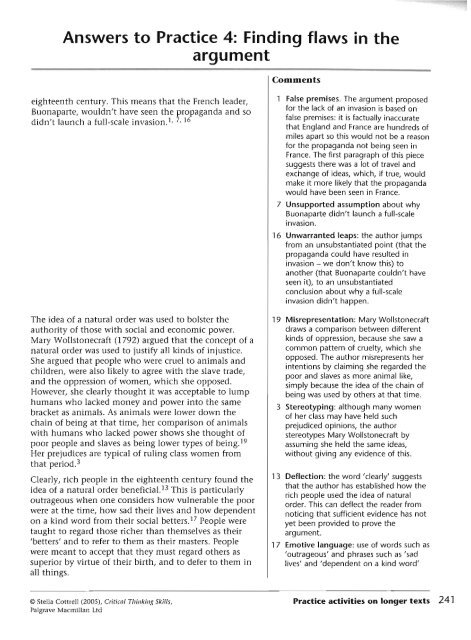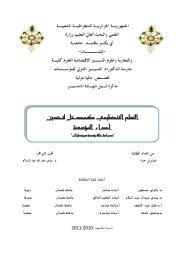Critical Thinking Skills - Developing Effective Analysis and Argument(2)
Critical Thinking Skills - Developing Effective Analysis and Argument(2)
Critical Thinking Skills - Developing Effective Analysis and Argument(2)
Create successful ePaper yourself
Turn your PDF publications into a flip-book with our unique Google optimized e-Paper software.
Answers to Practice 4: Finding flaws in the<br />
argument<br />
eighteenth century. This means that the French leader,<br />
Buonaparte, wouldn't have seen the propag<strong>and</strong>a <strong>and</strong> so<br />
didn't launch a full-scale invasion.l~ 71 l6<br />
The idea of a natural order was used to bolster the<br />
authority of those with social <strong>and</strong> economic power.<br />
Mary Wollstonecraft (1792) argued that the concept of a<br />
natural order was used to justify all kinds of injustice.<br />
She argued that people who were cruel to animals <strong>and</strong><br />
children, were also likely to agree with the slave trade,<br />
<strong>and</strong> the oppression of women, which she opposed.<br />
However, she clearly thought it was acceptable to lump<br />
humans who lacked money <strong>and</strong> power into the same<br />
bracket as animals. As animals were lower down the<br />
chain of being at that time, her comparison of animals<br />
with humans who lacked power shows she thought of<br />
poor people <strong>and</strong> slaves as being lower types of being.lg<br />
Her prejudices are typical of ruling class women from<br />
that peri~d.~<br />
Clearly, rich people in the eighteenth century found the<br />
idea of a natural order beneficial.13 This is particularly<br />
outrageous when one considers how vulnerable the poor<br />
were at the time, how sad their lives <strong>and</strong> how dependent<br />
on a kind word from their social betters.17 People were<br />
taught to regard those richer than themselves as their<br />
'betters' <strong>and</strong> to refer to them as their masters. People<br />
were meant to accept that they must regard others as<br />
superior by virtue of their birth, <strong>and</strong> to defer to them in<br />
all things.<br />
1 False premises. The argument proposed<br />
for the lack of an invasion is based on<br />
false premises: it is factually inaccurate<br />
that Engl<strong>and</strong> <strong>and</strong> France are hundreds of<br />
miles apart so this would not be a reason<br />
for the propag<strong>and</strong>a not being seen in<br />
France. The first paragraph of this piece<br />
suggests there was a lot of travel <strong>and</strong><br />
exchange of ideas, which, if true, would<br />
make it more likely that the propag<strong>and</strong>a<br />
would have been seen in France.<br />
7 Unsupported assumption about why<br />
Buonaparte didn't launch a full-scale<br />
invasion.<br />
16 Unwarranted leaps: the author jumps<br />
from an unsubstantiated point (that the<br />
propag<strong>and</strong>a could have resulted in<br />
invasion - we don't know this) to<br />
another (that Buonaparte couldn't have<br />
seen it), to an unsubstantiated<br />
conclusion about why a full-scale<br />
invasion didn't happen.<br />
19 Misrepresentation: Mary Wollstonecraft<br />
draws a comparison between different<br />
kinds of oppression, because she saw a<br />
common pattern of cruelty, which she<br />
opposed. The author misrepresents her<br />
intentions by claiming she regarded the<br />
poor <strong>and</strong> slaves as more animal like,<br />
simply because the idea of the chain of<br />
being was used by others at that time.<br />
3 Stereotyping: although many women<br />
of her class may have held such<br />
prejudiced opinions, the author<br />
stereotypes Mary Wollstonecraft by<br />
assuming she held the same ideas,<br />
without giving any evidence of this.<br />
13 Deflection: the word 'clearly' suggests<br />
that the author has established how the<br />
rich people used the idea of natural<br />
order. This can deflect the reader from<br />
noticing that sufficient evidence has not<br />
yet been provided to prove the<br />
arqument. -<br />
17 Emotive language: use of words such as<br />
'outrageous' <strong>and</strong> phrases such as 'sad<br />
lives' <strong>and</strong> 'dependent on a kind word'<br />
0 Stella Cottrell (ZOOS), Criticnl Tlriirkirrg <strong>Skills</strong>,<br />
Palgrave Macmillan Ltd<br />
Practice activities on longer texts 241



